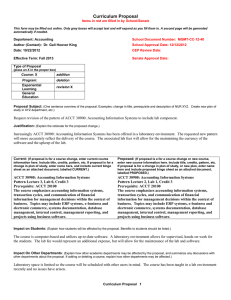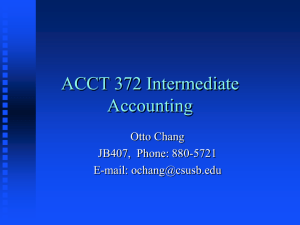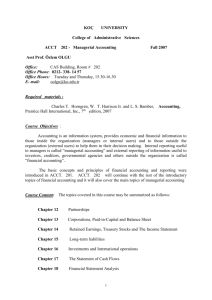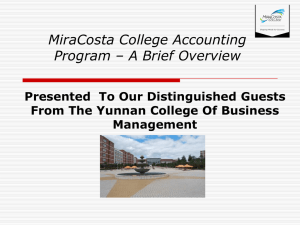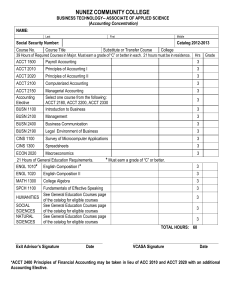BU13 (2014) Rev3 acct4023_NewCourse2015_Revised0417 (2)
advertisement
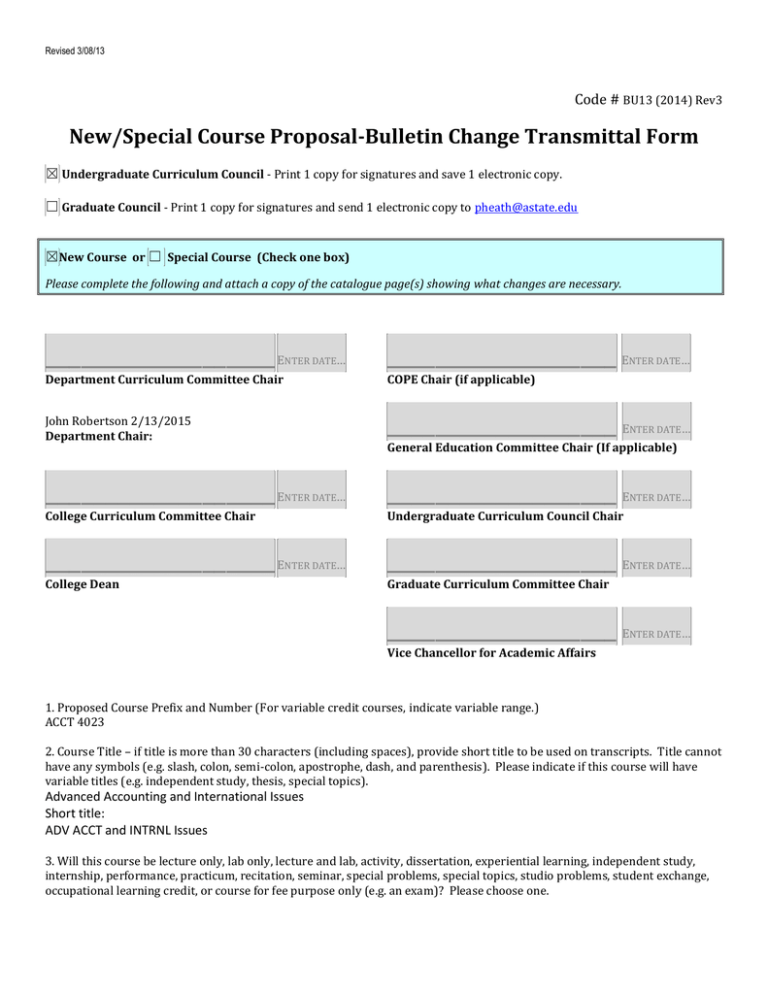
Revised 3/08/13 Code # BU13 (2014) Rev3 New/Special Course Proposal-Bulletin Change Transmittal Form ☒ Undergraduate Curriculum Council - Print 1 copy for signatures and save 1 electronic copy. ☐ Graduate Council - Print 1 copy for signatures and send 1 electronic copy to pheath@astate.edu ☒New Course or ☐ Special Course (Check one box) Please complete the following and attach a copy of the catalogue page(s) showing what changes are necessary. ___________________ ENTER DATE… Department Curriculum Committee Chair John Robertson 2/13/2015 Department Chair: ___________________ ENTER DATE… ___________________ ENTER DATE… ___________________ ENTER DATE… ___________________ ENTER DATE… COPE Chair (if applicable) General Education Committee Chair (If applicable) ___________________ ENTER DATE… ___________________ ENTER DATE… College Curriculum Committee Chair Undergraduate Curriculum Council Chair College Dean Graduate Curriculum Committee Chair ___________________ ENTER DATE… Vice Chancellor for Academic Affairs 1. Proposed Course Prefix and Number (For variable credit courses, indicate variable range.) ACCT 4023 2. Course Title – if title is more than 30 characters (including spaces), provide short title to be used on transcripts. Title cannot have any symbols (e.g. slash, colon, semi-colon, apostrophe, dash, and parenthesis). Please indicate if this course will have variable titles (e.g. independent study, thesis, special topics). Advanced Accounting and International Issues Short title: ADV ACCT and INTRNL Issues 3. Will this course be lecture only, lab only, lecture and lab, activity, dissertation, experiential learning, independent study, internship, performance, practicum, recitation, seminar, special problems, special topics, studio problems, student exchange, occupational learning credit, or course for fee purpose only (e.g. an exam)? Please choose one. Revised 3/08/13 Lecture only 4. What is the grade type (i.e. standard letter, credit/no credit, pass/fail, no grade, developmental)? Standard Letter 5. Is this course dual listed (undergraduate/graduate)? Yes 6. Is this course cross listed? (If it is, all course entries must be identical including course descriptions. It is important to check the course description of an existing course when adding a new cross listed course.) No 7. Brief course description (40 words or fewer) as it should appear in the bulletin. Advanced study of accounting concepts and problems in the areas of business combinations, partnerships, and international accounting. 8. Indicate all prerequisites and if this course is restricted to a specific major, which major. (If a student does not have the prerequisites or does not have the appropriate major, the student will not be allowed to register). a. Are there any prerequisites? Yes. ACCT 3033 with a grade of C or better. b. Why? This class requires students to be familiar with financial accounting. The course sequence that ends with ACCT 3033, Intermediate Accounting III, is where students gain an understanding of financial accounting. 9. Course frequency (e.g. Fall, Spring, Summer). Not applicable to Graduate courses. Spring 10. Contact Person (Name, Email Address, Phone Number) Tina Quinn, tquinn@astate.edu, 972-3796 11. Proposed Starting Term/Year Spring 2016 12. Is this course in support of a new program? No If yes, what program? Enter text... 13. Does this course replace a course being deleted? Yes If yes, what course? ACCT 6033 Advanced Accounting and Reporting Has this course number been used in the past? Yes. We are reusing the course number, the course title, and the course description. Submit Course Deletion Proposal-Bulletin Change Transmittal Form. 14. Does this course affect another program? No If yes, provide contact information from the Dean, Department Head, and/or Program Director whose area this affects. Enter text... 15. Justification should include: a. Academic rationale and goals for the course (skills or level of knowledge students can be expected to attain) Revised 3/08/13 Recent BS graduates have stated that they would have liked to have had the chance to take this class at the undergraduate level. This course permits the student to develop their critical thinking and research skills to apply professional judgment to solve problems and make and communicate business decisions. B. How does the course fit with the mission established by the department for the curriculum? If course is mandated by an accrediting or certifying agency, include the directive. The mission of the College of Business at Arkansas State University is to provide a high quality business education to traditional and non-traditional students from the Mid-South and international students emphasizing leadership, international business, technology, decision tools and social responsibility. In addition, the College of Business is committed to the support of regional businesses and communities through research, economic development and consultative services. This course ties the accounting program to the international portion of the COB mission. The course will require students to think beyond the numbers, resulting in a better developed understanding of multinational corporations in today’s global economy as well as statutory requirements of the SEC. Course activities will include a variety of homework assignments to develop analytical thinking, problem solving and communication skills. Material covered in this course may be tested in professional certification examinations. C. Student population served. Graduate and undergraduate accounting students in the College of Business D. Rationale for the level of the course (lower, upper, or graduate). This course provides a high-level, in-depth overview of complex accounting issues that requires sufficient preparation at the undergraduate level. 16. Outline (The course outline should be topical by weeks and should be sufficient in detail to allow for judgment of the content of the course.) Week 1: Chapter 1: The Equity Method of Accounting for Investments. Allocate the purchase price and compute amortization Application of the equity method of accounting Computing the balance in the investment account Computing the balance in the investment income account Accounting for unrealized gains in inventory Homework: Problems 14,15,28. Analysis Case, page 37. Week 2: Homework for chapter 1 due. Chapter 2: Consolidation of Financial Information. Why firms combine Types of business combinations Indicators of control What, when, and how consolidations take place Acquisition method, purchase method, pooling of interests method Homework: Problems 11-15 (show your work), Problem 24 (do worksheet and balance sheet), FASB ASC Research Case-Dow Chemical. Week 3: Homework for chapter 2 due. Revised 3/08/13 Chapter 3: Consolidations Subsequent to the Date of Acquisition. Initial value, partial equity and equity methods Intercompany balances Impairment of goodwill Amortization of acquisition date fair-value allocations Contingent consideration Push-down accounting Homework: Computer project on page 141. Week 4: Homework for chapter 3 due. Exam I Begin Chapter 4 Week 5: Chapter 4: Consolidated Financial Statements and Outside Ownership Accounting for a non-controlling interest Economic Unit Concept, proportionate consolidation, parent-company concept Step-transactions Change in percentage of ownership Problem 22, Problem 35, Accounting Theory Research Case on page 196. Week 6: Homework for Chapter 4 due. Chapter 5: Consolidated Financial Statements—Intra-entity Asset Transactions. Intercompany transfers of inventory Upstream v. downstream transactions Intercompany sales of land and depreciable assets Accounting for excess depreciation and unrealized gains or losses Homework: Problems 10-15, Problem 30, Analysis and Research Case. Week 7: Homework for chapter 5 due. Chapter 6: Variable Interest Entities, Intra-entity Debt, Consolidated Cash Flows, and Other Issues.* Consolidation of VIEs Elimination of Intercompany debt Consolidated Statement of Cash Flows Impact of preferred stock on consolidation process Computing Basic and Diluted Earnings per Share Effect of subsidiary’s transactions in its own stock Week 8: Homework for chapter 6 due. Exam II Begin Chapter 9 Revised 3/08/13 Week 9: Chapter 9: Foreign Currency Transactions and Hedging Foreign Exchange Risk.* Foreign exchange markets Foreign currency transactions Hedging foreign currency exchange risk Accounting for derivatives Hedge accounting Week 10: Chapter 9 homework due. Chapter 10: Translation of Foreign Currency Financial Statements. Exchange rates used in translation Translation methods Translation of financial statements Remeasurement of financial statements Disposition of translation adjustment Hedging balance sheet exposure Week 11: Chapter 10 homework due. Chapter 11: Worldwide Accounting Diversity and International Standards Week 12: Chapter 11 Homework due. Chapter 12: Financial Reporting and the Securities and Exchange Commission. Purpose of the Federal Securities Laws Corporate accounting scandals and the Sarbanes-Oxley Act Creation of the PCAOB Registration of public accounting firms Filings with the SEC EDGAR Week 13: Chapter 12 homework due. Chapter 13: Accounting for Legal Reorganizations and Liquidations. Bankruptcy Reform Act of 1978 Statement of Financial Affairs Role of Trustee Plan of Reorganization Financial reporting during reorganization Fresh Start Accounting Illustrated Week 14: Chapter 13 homework due. Chapter 14: Partnerships--Formation, Operation, and Distributions. Graduate Student Presentations Revised 3/08/13 17. Course requirements (e.g. research papers, projects, interviews, tests, etc.) Homework assignments, quizzes, and tests. 18. Special features (e.g. labs, exhibits, site visitations, etc.) None 19. Department staffing and classroom/lab resources (Will this require additional faculty, supplies, etc.?) No additional resources will be required. 20. What is the primary intended learning goal for students enrolled in this course? - When students have finished their studies in this course, they will be able to explain the purpose of, and will be able to prepare correctly, consolidated financial statements. 21. Reading and writing requirements: a. Name of book, author, edition, company and year Advanced Accounting, 12e, by Hoyle, Schaefer, and Doupnik (Irwin/McGraw-Hill, Inc: 2015). b. Number of pages of reading required per week: approximately 40 c. Number of pages of writing required over the course of the semester: 15 22. High-Impact Activities (Check all that apply) ☐ Collaborative assignments ☐ Research with a faculty member ☐ Diversity/Global learning experience ☐ Service learning or community learning ☐ Study abroad ☐ Internship ☐ Capstone or senior culminating experience ☐ Other Explain: Enter text... 23. Considering the indicated primary goal (in Box #20), provide up to three outcomes that you expect of students after completion of this course. Outcome #1: (For example, what will students who meet this goal know or be able to do as a result of this course?) Students will be able to prepare correctly consolidated financial statements. Learning Activity: (For example, what instructional processes do you plan to use to help students reach this outcome?) Reading, lecture. Assessment Tool: (For example, what will students demonstrate, represent, or produce to provide evidence of their learning?) On a comprehensive assignment, students would be asked to make calculations about specific investments in other companies’ stock based on separate company financial statements for the parent company and its investments in both controlled subsidiaries and non-controlled companies, The successful student will be able to demonstrate an understanding of the proper adjustments to make, will be able to calculate the correct amounts of the adjustments, and will be able to combine and consolidate subsidiaries with the parent company. Revised 3/08/13 24. Please indicate the extent to which this course addresses university-level student learning outcomes: a. Global Awareness ☐ Minimally ☐ Indirectly ☒ Directly b. Thinking Critically ☐ Minimally ☐ Indirectly ☒ Directly c. Using Technology ☐ Minimally ☒ Indirectly ☐ Directly From the most current electronic version of the bulletin, copy all bulletin pages that this proposal affects and paste it to the end of this proposal. To copy from the bulletin: 1. 2. 3. 4. 5. 6. 7. 8. 9. 10. Minimize this form. Go to http://registrar.astate.edu/bulletin.htm and choose either undergraduate or graduate. This will take you to a list of the bulletins by year, please open the most current bulletin. Find the page(s) you wish to copy, click on the “select” button and highlight the pages you want to copy. Right-click on the highlighted area. Click on “copy”. Minimize the bulletin and maximize this page. Right-click immediately below this area and choose “paste”. For additions to the bulletin, please change font color and make the font size larger than the surrounding text. Make it noticeable. For deletions, strike through the text, change the font color, and enlarge the font size. Make it noticeable. ACCT 4023. Advanced Accounting and International Issues Advanced study of accounting concepts and problems in the areas of business combinations, partnerships, and international accounting. Prerequisite, ACCT 3033 with a grade of C or better. Spring. ACCT 4053. Auditing I Standards and procedures, code of ethics, form of audit reports and statements, and the principles underlying the verification of data presented in financial reports. Prerequisites, ACCT 3013 with a grade of C or better and ECON 2113. Fall, Summer. ACCT 4113. Tax Accounting II Continuation of Tax Accounting I. Emphasis in this course will be on federal income tax laws for partnerships, fiduciaries, and corporations. Prerequisite, ACCT 4013. Fall. ACCT 4123. Government and Not-For-Profit Accounting Accounting concepts and reporting standards for state or local government entities and not-for-profit organizations. Emphasis is on areas covered in CPA exam content specifications. Prerequisite, ACCT 3013 with a grade of C or Revised 3/08/13 better. Spring, Summer. ACCT 4143. International Accounting Introduction to international accounting issues including political, legal, and cultural influences, international accounting standards, foreign currency transactions, consolidated reporting for global firms, planning, control, and performance measurement systems, transfer prices and taxation. Prerequisite ACCT 2133 with C or better. Fall. ACCT 4153. Fraud Examination A study of how and why occupational fraud is committed, how fraudulent conduct can be deterred, and how allegations of fraud should be investigated and resolved. Prerequisite ACCT 2133 with C or better. Spring. ACCT 4163. Estate Planning and Taxation Introduction to estate planning, including transfer of different types of property during life and at death, documents used in estate planning, and taxation of property transfers at the state and federal levels. Prerequisite, ACCT 4013. Spring. ACCT 430V. Special Problems in Accounting Individual problems or topics in accounting arranged in consultation with the instructor. Must be approved by department chair. Demand. ACCT 4783. Internship in Accounting Provides practical financial, managerial, or not for profit experience through work in a meaningful capacity. Prerequisite, 12 hours of accounting above the principals level and approval of departmental chair. Fall, Spring, Summer. Business Technology (BTEC) DEPARTMENT OF COMPUTER AND INFORMATION TECHNOLOGY ****IMPORTANT INFORMATION**** EDBU 4533 METHODS AND MATERIALS IN TEACHING BUSINESS TECHNOLOGY and TIBU 4825 BUSINESS TEACHING INTERNSHIP IN THE SECONDARY SCHOOL, for BSE Students, TIBU 4826 BUSINESS TEACHING INTERNSHIP IN THE SECONDARY SCHOOL, for 2nd Degree Students, are located at other locations on the Class Schedule Search engine. Please follow the directions below for each course to obtain the correct location for each educational course. EDBU 4533, METHODS AND MATERIALS IN TEACHING BUSINESS TECHNOLOGY 1. Go to Class Schedule Search. 2. Select Method and Mat Teach EDBU Voc. 3. Click on Class Search, METHODS AND MATERIALS IN TEACHING BUSINESS TECHNOLOGY will appear. BSE students ONLY TIBU 4826, BUSINESS TEACHING INTERNSHIP IN THE SECONDARY SCHOOL You will receive an email from the Professional Education Program, PEP, office issuing you a permit allowing you to register for this class. 2nd Degree Students TIBU 4825, BUSINESS TEACHING INTERNSHIP IN THE SECONDARY SCHOOL You will receive an email from the Professional Education Program, PEP, office issuing you a permit allowing you to register for this class 408
